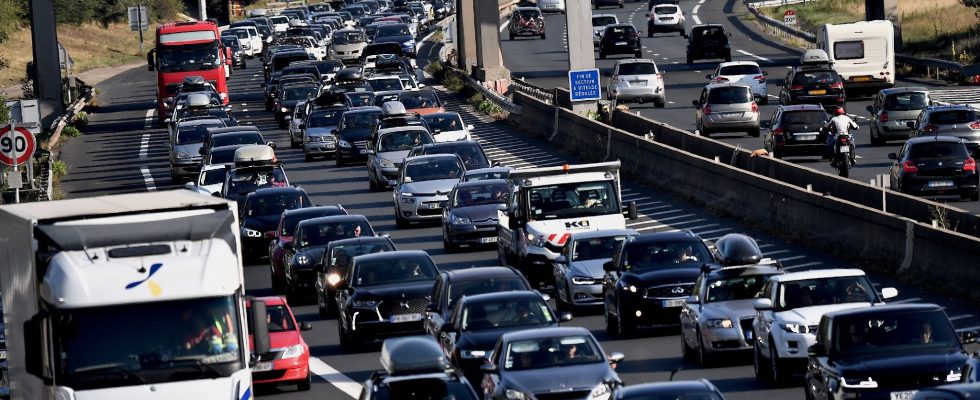And in the end Germany wins, you might say. After several weeks of turmoil within the European authorities, the Commission and Germany announced on Saturday that they had found common ground to unblock a key text of the European Union’s climate plan relating to CO2 emissions from cars. . “We have reached an agreement with Germany on the future use of synthetic fuels in cars”, announced on Twitter European Commissioner for the Environment Frans Timmermans. “From now on, we will work to get the regulation on CO2 standards for cars adopted as soon as possible,” he added.
At the beginning of the month, Germany took everyone by surprise by blocking the last legislative procedure allowing the end of the sale of cars equipped with CO2-emitting engines in 2035, a measure which imposed de facto cars 100% electrical. The text had however been the subject of an agreement in October between the Member States and the European Parliament, and had been formally approved in mid-February by MEPs. Under pressure from the automotive lobby, Germany had suspended its vote in early March and demanded that the Commission present a proposal paving the way for vehicles running on synthetic fuels, produced from CO2 and hydrogen.
So what does this new agreement change? “Vehicles equipped with a combustion engine can be registered after 2035 if they only use neutral fuels in terms of CO2 emissions,” said German Transport Minister Volker Wissing. The compromise, which therefore leaves the door open to the use of these fuels, is still subject to interpretation. “The text validated by parliament a few weeks ago will indeed be voted on by the council and it is unchanged. The rule of 100% zero-emission cars in 2035 is therefore maintained”, assures Pascal Canfin, MEP and president of the Environment, Public Health and Food Safety Committee.
German electoral problem
The proposal to fully integrate synthetic fuels, or e-fuels, was enough to make supporters of strict decarbonization of the transport sector tremble. Because these fuels, still at the experimental stage, are particularly decried by transition specialists because of their energy consumption during their production, and the residual emissions they release despite everything. “E-fuel, today, there is none, denounces Marie Chéron of the Transport and Environment Association. It is used in certain racing vehicles that Porsche or BMW have supported, but in practice it cannot be the solution. Its production requires five times more energy than to power a car with an electric battery!”
For many observers, the German blockage was in fact based on an electoral problem of the liberals of the FDP. A small party, credited with about 5% of voting intentions in national polls, which hopes to assert itself against environmentalists by posing as a defender of the automobile. To ensure the unity of his coalition, the Social Democratic Chancellor, Olaf Scholz, therefore preferred to align himself with the FDP’s request, to the chagrin of supporters of a strict decarbonisation of the sector in Europe.
Because this measure, adopted after a long negotiation, is one of the most emblematic of the EU’s “Fit for 55” legislative package, a set of 12 texts which should make it possible to achieve climate neutrality by 2050 and meet the target of reducing greenhouse gas emissions by at least 55% by 2030 compared to 1990.
No questioning of the advent of electricity
It remains to be seen how this compromise will actually be applied. The agreement seems to require that these fuels do not emit any CO2 into the atmosphere, which will still have to be verified. Above all, the NGOs fear that these e-fuels will make it possible to extend the use of conventional fuels a little further. “Synthetic fuels are a costly and extremely inefficient diversion from the transformation to electricity in which European car manufacturers are already engaged”, denounced Saturday, Transport and Environment.
And basically, the German position can not really call into question the advent of the electric vehicle. Many manufacturers have already embarked on the transition and have invested heavily in this. Like the French group Stellantis, which plans to anticipate European regulations and which will market only electric cars from 2030. And even among German manufacturers, where the question of the electric shift has been thought about for a long time, some could find themselves irritated by these political errors. “You have to be aware that Volkswagen recently announced a 32 billion euro investment plan which includes 24 for electricity. They are committed to cars, but also batteries, and they are not going to put back in question their entire ecosystem”, underlines Bernard Jullien, lecturer at the University of Bordeaux and specialist in the automotive industry.
Moreover, not all manufacturers believe in the massive use of these fuels. Even if they prove their worth, synthetic fuels, which do not exist today, “will not play an important role in the medium term in the segment of passenger cars”, declared Markus Duesmann, the boss of Audi ( Volkswagen group), to the weekly Spiegel. A sign that this German blockage was above all a matter of posture.
